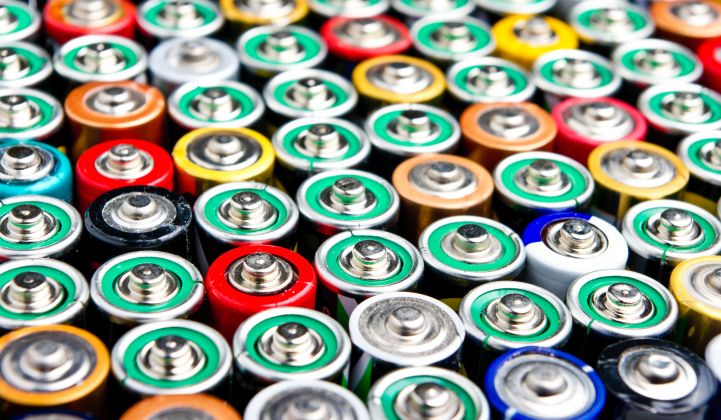BioSolar, which faced challenges commercializing a bio-based PV backsheet technology in the late 2000s, is making very ambitious claims about a “breakthrough super battery technology.”
The company says it has a novel cathode design, based on inexpensive conductive polymers and organic materials, that boosts capacity so lithium-ion battery cathodes “can fully utilize the storage capacity of traditional anodes,” according to a spokesperson.
“By integrating BioSolar’s high capacity, high power and low-cost cathode with conventional anodes, which fit existing battery manufacturing processes and infrastructure, manufacturers can hopefully create a super lithium-ion battery that can double the range of a Tesla," declared the company.
BioSolar estimates it can pull battery costs down to $54 per kilowatt-hour -- a ridiculously low (and unproven) target.
Whereas traditional lithium-aluminum or lithium-ion-phosphate cathodes rely on intercalation chemistry, BioSolar’s conducting polymer variant works on a redox basis.
BioSolar CEO David Lee said the BioSolar cathode manufacturing process might be simpler than current methods and could also help increase the lifespan of the battery.
Lee said the patented technology has been developed in association with Alan Heeger, a professor of physics and materials at the University of California, Santa Barbara, who won the 2000 Nobel Prize in chemistry for the discovery and development of conductive polymers.
“We found out that the same material can be used in lithium-ion batteries,” Lee said. “We can double the capacity of the existing lithium-ion battery without drastically changing the internal workings by using a new cathode. Laboratory work proved earlier this year that we can double the capacity.”
That alleged capacity improvement comes with a fourfold reduction in cost compared to Tesla’s battery technology, said Lee. BioSolar is currently in the process of building a prototype that it wants to show to potential partners and customers within the next six months.
As any battery startup can attest, that kind of rapid timeframe -- even for proof of concept -- is almost never achieved.
BioSolar is a public company that has raised about $5 million on the OTC Markets Group marketplace (previously known as Pink Sheets). Shares are currently trading at around 20 cents.
BioSolar has made big promises previously in its history. Back in 2008, it promoted an environmentally-friendly PV backsheet that cost 25 percent less than Tedlar, the market leader from DuPont.
Lee said the pivot away from backsheet technology occurred because of difficulties in breaking into the solar-component market after Chinese modules brought down PV prices from around 2008 onward.
“The company mission when we started out in 2006 was to make solar energy a truly green energy,” he said. “One way to do that was to replace petroleum-based components of PV with something that’s environmentally friendly, is durable and has other advantages. “We succeeded technically, had a lot of customers wanting to use it, and also we obtained our U.S. patent. Unfortunately, any PV component market is not immune to the changes that happen in the PV market."
Hugh Sharman, principal at Incoteco, an international energy consulting firm, said he was unimpressed by BioSolar’s latest battery claims.
“Let’s make a return visit in, say, 10 years’ time, when they have moved from bench scale to grid-scale prototype,” he said, “if nothing goes wrong during the long valley of death.”
Even Lee conceded that swaying potential customers might not be easy.
“The only way we can convince our large commercial partners is through the merits of the technology, not the size of the company, not how much money we have,” he said.



